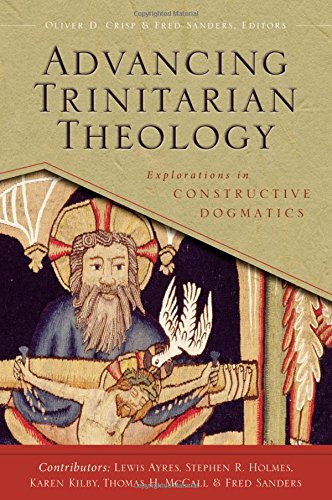A Book Summary from Books At a Glance
About the Editors
Oliver D Crisp (PhD, King’s College, London) is professor of systematic theology at Fuller Theological Seminary in Pasadena, California. He is author of numerous books in analytic and systematic theology.
Fred Sanders (PhD, Graduate Theological Union) is professor of theology in the Torrey Honors Institute at Biola University in La Mirada, California. Dr. Sanders is a core participant in the Theological Engagement with California Culture Project and a popular blogger at Scriptorium.
Overview
This collection of essays were taken from the proceedings of the Los Angeles Theological Conference held under the auspices of the School of theology in Fuller Theological Seminary, with the support of Biola University in January 2014. These essays address the contemporary state and contemporary debates in Trinitarian theology.
Table of Contents
Introduction
1. What Trinitarian Theology is For: Placing the Doctrine of the Trinity in Christian Theology and Life, by Fred Sanders
2. Trinity Doctrine, Plain and Simple, by Thomas H. McCall
3. Trinitarian Action and Inseparable Operations: Some Historical and Dogmatic Reflections, by Thomas R. Holmes
4. Trinity and Politics: An Apophatic Approach, Karen Kilby
5. “As We are One”: Thinking into the Mystery, by Lewis Ayres
6. “The Name that is Above Every Name”: The Eternal Identity of the Second Person of the Trinity and the Covenant of Grace, by R. Kendall Soulen
7. Obedience and Subordination in the Lark Barth’s Trinitarian Theology, by Darren O. Sumner
8. Theology in the Gaze of the Father: Retrieving Jonathan Edwards’s Trinitarian Aesthetics, by Kyle C. Strobel
9. A Confessing Trinitarian Theology for Today’s Mission, by Jason S. Sexton
Chapter One:
What Trinitarian Theology is For
Fred Sanders opens his chapter with commentary on an artistic rendering of the gospel as depicted in a medieval altarpiece by Eilbertus of Cologne. The Trinitarian focus of this piece serves as the inspiration for Sanders’ main concern in this chapter: “the dogmatic function of the doctrine of the Trinity in the overall structure of Christian theology and life.” Specifically, Sanders is interested in how the Trinity should shape the way we do systematic theology. He provides the following five possibilities.
Summarizing the Biblical Story. Sanders sees the central message of Scripture as revealing not simply what God does or what he wants, but primarily revealing Who He is: Father, Son, and Holy Spirit. He summarizes the entire Bible this way: “the Father sends the Son and the Holy Spirit.” Coming to this conclusion requires much more than just an assemblage of proof-texts, but a canonical reading of the Scripture. One must be aware of the whole, see the whole as constructing a coherent and unified story, and recognize the purpose or plot of this story
[To continue reading this summary, please see below....]The remainder of this article is premium content. Become a member to continue reading.
Already have an account? Sign In
